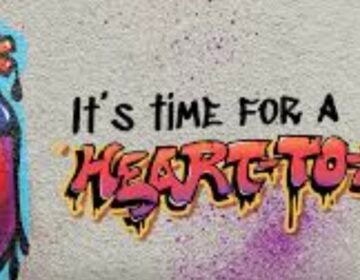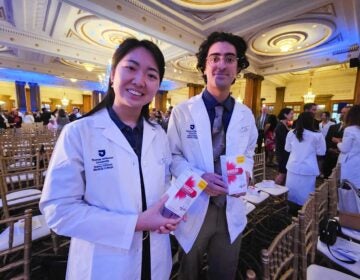Recognizing signs of drug problems in college students home for vacation
Frank Greenagel specializes in addiction recovery at the Center for Alcohol Studies at Rutgers University. He sat down with "Morning Edition" host Jennifer Lynn.
Listen 6:20
Rutgers social worker Frank Greenagle says as opioid drug use is increasing on college campuses, parents should be on the lookout for warning signs of drug abuse while their children are home on break. (image courtesy of Rutgers Today)
Over the course of the holidays, college students home for winter break have hopefully been sharing stories of what they’ve learned and what they’ve done during the fall semester.
A local social worker says if you’re not hearing a peep about these things, there may be some cause for concern.
Frank Greenagel specializes in addiction recovery. He teaches at the School of Social Work at the Center for Alcohol Studies at Rutgers University. He sat down with “Morning Edition” host Jennifer Lynn about behaviors that may indicate drug and alcohol problems. And, while illicit drug use is hardly a new trend on college campuses, Greenagel laid out current preferences among undergrads.
You can hear the conversation in the audio player above. The following has been edited for clarity.
—
Jennifer Lynn: Frank, what are drugs of choice on campuses, to the best of your knowledge?
Frank Greenagel: I’ve been tracking this data for just about ten years, and alcohol is still the king, but marijuana has continued to increase in its popularity and that’s the result of legalization and medicalization and the continued reduction of stigma. The No. 3 is a runaway and that’s Adderall. Again, that’s the result of not having much of a stigma. And then probably, to no one’s surprise, opiates — and all the different derivatives — is the No. 4 most popular drug on college campuses across America.
JL: I’ve read your blog and I’m really troubled by what you say is an increasing use of opioids by college students. What would you say is a fair assessment of how widespread a problem this is?
FG: The problem is bigger than people can imagine (because of) the availability. The epidemic really sprang up with the proliferation of prescription pills. Students can get them for taking their wisdom teeth out or if they’ve had some kind of surgery (because) they’re an athlete and hurt their knee or shoulder. But they also have access to parents’ or grandparents’ or other relatives’ pills as well. And they’re just not looked at the same way as illicit drugs. So someone will return to campus and they’ll have a bottle of pills and they don’t think of it as that dangerous because it’s made by a multi-million-dollar corporation in a pristine lab and prescribed by a doctor, so basically it has the stamp of validation from many levels of society. I’ve dealt with students who’ve gotten in a lot of legal trouble because they were selling the pills or sharing the pills on campus and these are Schedule II drugs, so if you share those pills or sell even one pill to someone on your floor, you’re now a Schedule II drug dealer.
JL: Let’s go back to prescription “focus” drugs. Adderall use is huge.
FG: Adderall use has been completely destigmatized. And this fall I was walking around campus at Rutgers, coming back from one of the courses I taught. There were three young men outside talking about midterms, and one of them said that he had lots of papers to do and another couple of exams, but he took a couple Adderall and he was able to plow through it. These stimulant drugs work not only with people who have Attention Deficit Hyperactivity Disorder, but they work on all humans. As a result, you’re going to be able to concentrate more, sleep less, eat less, get a little extra motivation. What you’re finding is that even top students in difficult majors are doing this. Adderall was clearly the most abused drug with lots of short- and long-term psychological and physiological issues.
JL: Information universities may have about use and/or abuse is hard to get.
FG: That data is almost never being tracked. These kinds of numbers fall through the cracks, and so it’s only when we have a kind of national survey. There’s a group out of Ohio State called Generation Rx which tracked prescription drug abuse on campus. They have some interesting numbers that people can look up. But for the most part, it’s not reported and partly, it’s in schools’ economic interests to not do that. No school wants to be known as “the opiate school” or “the alcohol school” or “the Adderall school.”
JL: If you’re a parent of a student home on winter break now, what might be a sign of trouble?
FG: There’s a couple of things. Has there been a marked change? I don’t mean, did your daughter dye her hair or did your son grow a beard? And I’m not too concerned with changes in style of clothing like if someone became a goth or a punk. But was there a noticeable weight change, either weight gain or, more likely, weight decrease? That’s a significant sign. Another one is when they’re home, are they talking about what they studied? Was there a professor or a topic that engaged them? If they are talking about that, that’s a really good sign that they’re getting a lot out of school. If, on the other hand, they remind you of the teenage years where there’s monosyllabic answers and school is fine and they’re not talking about any kind of classes or activities that interest them, that’s kind of problematic because that interest has to go somewhere. I was telling you when we talked earlier today about a young man who went off to a university out West. He was enrolled in an ROTC (Reserve Officers’ Training Corps) program. And this is a guy who since the age of nine, knew he wanted to do the military and eventually go into law enforcement. And in the fall of his freshman year, he dropped out of the ROTC program. Giving up something that is of huge value to an individual is a big sign that there is a possible substance use disorder or mental health disorder going on.
JL: Just to sum it up, what’s the first step to remaining a student while addressing a drug health crisis?
FG: The fist step is recognizing that there is a problem, and it’s great if the student themselves can recognize it. Parents and friends, I really recommend going to a couple of Al-Anon meetings. Al-Anon is for friends, family members, or romantic partners of someone who has a drug or alcohol problem, and you can hear the stories of people who are similar to you or much further along. Outside of Philadelphia, in Hamilton, New Jersey, there’s a program called City of Angels NJ, Inc. that does intervention work with families, and they’ll work with families for hours before they even engage in such intervention work because families need to be prepared for the emotional blow back that come when you confront someone regardless of age about their alcohol and drug problem.
WHYY is your source for fact-based, in-depth journalism and information. As a nonprofit organization, we rely on financial support from readers like you. Please give today.





